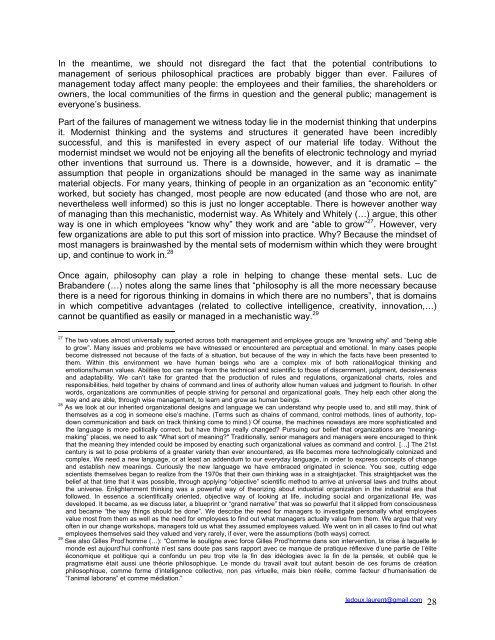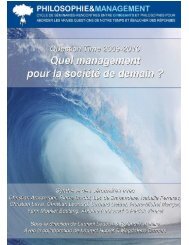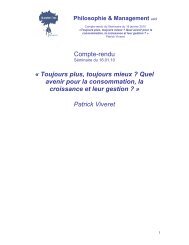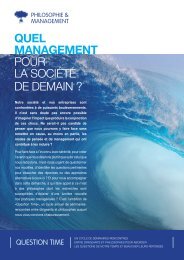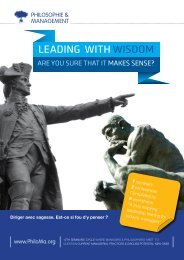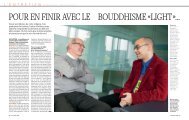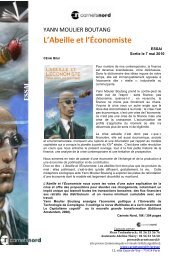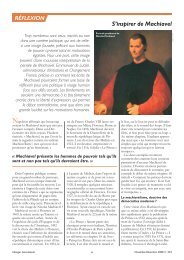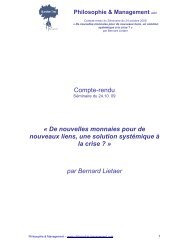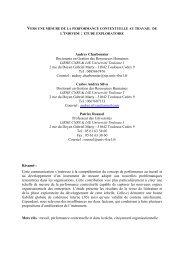Philosophy: The Managers - Philosophie Management
Philosophy: The Managers - Philosophie Management
Philosophy: The Managers - Philosophie Management
Create successful ePaper yourself
Turn your PDF publications into a flip-book with our unique Google optimized e-Paper software.
In the meantime, we should not disregard the fact that the potential contributions to<br />
management of serious philosophical practices are probably bigger than ever. Failures of<br />
management today affect many people: the employees and their families, the shareholders or<br />
owners, the local communities of the firms in question and the general public; management is<br />
everyone’s business.<br />
Part of the failures of management we witness today lie in the modernist thinking that underpins<br />
it. Modernist thinking and the systems and structures it generated have been incredibly<br />
successful, and this is manifested in every aspect of our material life today. Without the<br />
modernist mindset we would not be enjoying all the benefits of electronic technology and myriad<br />
other inventions that surround us. <strong>The</strong>re is a downside, however, and it is dramatic – the<br />
assumption that people in organizations should be managed in the same way as inanimate<br />
material objects. For many years, thinking of people in an organization as an “economic entity”<br />
worked, but society has changed, most people are now educated (and those who are not, are<br />
nevertheless well informed) so this is just no longer acceptable. <strong>The</strong>re is however another way<br />
of managing than this mechanistic, modernist way. As Whitely and Whitely (…) argue, this other<br />
way is one in which employees “know why” they work and are “able to grow” 27 . However, very<br />
few organizations are able to put this sort of mission into practice. Why? Because the mindset of<br />
most managers is brainwashed by the mental sets of modernism within which they were brought<br />
up, and continue to work in. 28<br />
Once again, philosophy can play a role in helping to change these mental sets. Luc de<br />
Brabandere (…) notes along the same lines that “philosophy is all the more necessary because<br />
there is a need for rigorous thinking in domains in which there are no numbers”, that is domains<br />
in which competitive advantages (related to collective intelligence, creativity, innovation,…)<br />
cannot be quantified as easily or managed in a mechanistic way. 29<br />
27<br />
<strong>The</strong> two values almost universally supported across both management and employee groups are “knowing why” and “being able<br />
to grow”. Many issues and problems we have witnessed or encountered are perceptual and emotional. In many cases people<br />
become distressed not because of the facts of a situation, but because of the way in which the facts have been presented to<br />
them. Within this environment we have human beings who are a complex mix of both rational/logical thinking and<br />
emotions/human values. Abilities too can range from the technical and scientific to those of discernment, judgment, decisiveness<br />
and adaptability. We can’t take for granted that the production of rules and regulations, organizational charts, roles and<br />
responsibilities, held together by chains of command and lines of authority allow human values and judgment to flourish. In other<br />
words, organizations are communities of people striving for personal and organizational goals. <strong>The</strong>y help each other along the<br />
way and are able, through wise management, to learn and grow as human beings.<br />
28<br />
As we look at our inherited organizational designs and language we can understand why people used to, and still may, think of<br />
themselves as a cog in someone else’s machine. (Terms such as chains of command, control methods, lines of authority, topdown<br />
communication and back on track thinking come to mind.) Of course, the machines nowadays are more sophisticated and<br />
the language is more politically correct, but have things really changed? Pursuing our belief that organizations are “meaningmaking”<br />
places, we need to ask “What sort of meaning?" Traditionally, senior managers and managers were encouraged to think<br />
that the meaning they intended could be imposed by enacting such organizational values as command and control. […] <strong>The</strong> 21st<br />
century is set to pose problems of a greater variety than ever encountered, as life becomes more technologically colonized and<br />
complex. We need a new language, or at least an addendum to our everyday language, in order to express concepts of change<br />
and establish new meanings. Curiously the new language we have embraced originated in science. You see, cutting edge<br />
scientists themselves began to realize from the 1970s that their own thinking was in a straightjacket. This straightjacket was the<br />
belief at that time that it was possible, through applying “objective” scientific method to arrive at universal laws and truths about<br />
the universe. Enlightenment thinking was a powerful way of theorizing about industrial organization in the industrial era that<br />
followed. In essence a scientifically oriented, objective way of looking at life, including social and organizational life, was<br />
developed. It became, as we discuss later, a blueprint or “grand narrative” that was so powerful that it slipped from consciousness<br />
and became “the way things should be done”. We describe the need for managers to investigate personally what employees<br />
value most from them as well as the need for employees to find out what managers actually value from them. We argue that very<br />
often in our change workshops, managers told us what they assumed employees valued. We went on in all cases to find out what<br />
employees themselves said they valued and very rarely, if ever, were the assumptions (both ways) correct.<br />
29<br />
See also Gilles Prod’homme (…): “Comme le souligne avec force Gilles Prod’homme dans son intervention, la crise à laquelle le<br />
monde est aujourd’hui confronté n’est sans doute pas sans rapport avec ce manque de pratique réflexive d’une partie de l’élite<br />
économique et politique qui a confondu un peu trop vite la fin des idéologies avec la fin de la pensée, et oublié que le<br />
pragmatisme était aussi une théorie philosophique. Le monde du travail avait tout autant besoin de ces forums de création<br />
philosophique, comme forme d’intelligence collective, non pas virtuelle, mais bien réelle, comme facteur d’humanisation de<br />
“l’animal laborans” et comme médiation.”<br />
ledoux.laurent@gmail.com<br />
28


